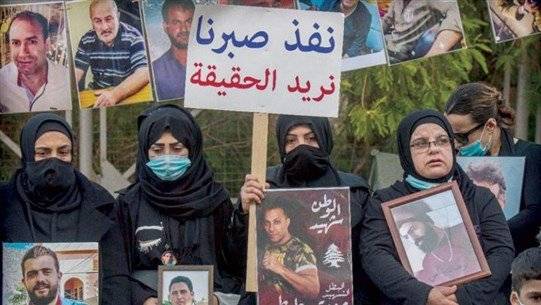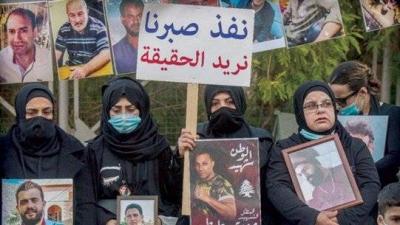The return of economic activity to the port of Beirut, two years after its explosion, does not hide the grief etched on the faces of the victims' families, who are angered by the widespread culture of impunity. The emotional impact also lingers among the injured, some of whom remain hospitalized. Over the past two years, Lebanese authorities have addressed the economic repercussions of the port explosion, while humanitarian associations and international organizations have undertaken the repair of homes, hospitals, and educational institutions, facilitating the return of some residents to the affected areas around the port. However, they have failed to ensure the progression of justice, which has been mired in political disputes and local disagreements among parties and influential forces, due to accusations of selectivity and politicization of the judicial file.
These circumstances have led several residents and activists to support the victims' families as they commemorate the second anniversary of the explosion today, which is among the largest non-nuclear explosions globally, claiming the lives of 224 individuals according to statistics from the victims' families' committee, and injuring more than 6,500 others, causing widespread destruction in the capital.
According to authorities, the explosion resulted from the storage of massive amounts of ammonium nitrate at the port without safety measures, following a fire whose cause remains unknown. Subsequent investigations revealed that officials at various levels were aware of the dangers of storing this material but took no action.
**Public Rallies**
The anniversary is observed through popular action, with three marches planned: the first from the Beirut Court of Justice to the port, the second from the center of Beirut in front of the "An-Nahar" newspaper building to the port, and the third from the Fire Brigade Center. All three marches will converge in front of the expatriate statue at 5 PM today. The objective of this public mobilization is to remind the authorities of their failure to fulfill their responsibilities and hold those accountable for the explosion. Activists accuse the state of attempting to erase the memory of the disaster, especially given plans to demolish the grain silos, the most prominent witness of the explosion, through previous proposals to destroy them, which have since been retracted. Additionally, they argue that the silos are left vulnerable to deterioration and collapse, with no measures taken to protect them.
**Investigations into the Case**
Efforts to bring in an international fact-finding committee to oversee the investigations into the port case have failed. Despite a call from more than fifty Lebanese and international organizations and the victims' families in mid-June 2021 for the Human Rights Council to "create an independent and neutral international investigation mission, similar to a one-year fact-finding mission," their request went unheeded.
Legally, the path to justice has gone through two phases: the first phase involved appointing acting military investigative judge Fadi Sawan in August 2020 as the judicial investigator in the port case, until the Court of Cassation ordered his removal in February 2021 after accepting a lawsuit demanding this, following his request to interrogate former Prime Minister Hassan Diab and three former ministers.
The second phase saw the appointment of Judge Tarek Bitar as the judicial investigator in the port explosion case in February 2021. Bitar charged five figures, including former ministers Ali Hassan Khalil, Ghazi Zeaiter, Nohad Machnouk, and Youssef Fenianos, as well as former Prime Minister Hassan Diab. He later issued arrest warrants against Khalil and Zeaiter but faced 35 lawsuits seeking to remove him from the case, leading to a halt in judicial proceedings since December 2021.
"Amal Movement," "Hezbollah,” "Mard Movement," and Sunni figures have accused Judge Bitar of selectivity and politicization. Accusations of selectivity stem from two points: first, the failure to summon former justice ministers, despite their administrative powers being similar to that of the finance minister, which has further strained relations between the "Amal Movement" led by Parliament Speaker Nabih Berri and the president's team and the "Free Patriotic Movement." The second basis for the accusations is the argument that the indictment of ministers and presidents is not within the authority of the judicial investigator, who is supposed to refer the case to the "Supreme Council for the Trial of Presidents and Ministers."
Amid this stalemate, the "Lebanese Forces" Party filed an official petition to the UN Human Rights Council calling for the establishment of an international fact-finding committee to assist the Lebanese investigation into the port explosion crime.
**The Silos**
Parliament failed to approve a legislative proposal put forth by MP Paula Yacoubian to convert the silos into a historical monument witnessing the explosion. The silos at the port suffered severe damage due to the 2020 explosion when they absorbed the shockwave, which led to their destruction. All attempts to remove the stored grains from certain pockets have failed due to the structural damage to the facility.
Parts of the silos have begun to collapse due to moisture and heat from the fermentation of the grains inside, leading to ongoing fires. Fires have ignited in grains that are difficult to access in the northern part of the silos, threatening the concrete structure’s stability due to the high heat from fires that have been intermittently burning for a month, amidst challenges in handling them because of the facility's structural integrity, which stands as a testament to the port explosion.
The government states that "the grains located on the eastern side of the silos, which have not been processed due to the dangers of reaching them, are estimated at 3,000 tons, of which 800 tons recently began to self-ignite due to climatic factors, reaching temperatures exceeding 95 degrees Celsius due to the fermentation." They claim the emissions from this fermentation pose no danger to public health.
Experts estimate that the fires will extinguish once the quantity is depleted and caution against using water to put them out, which would worsen the situation and increase fermentation and combustion.
**Development Projects at the Port**
A few weeks after the port explosion, the vital facility returned to normal operations, and the container terminal was contracted to a French company to enhance state revenues, which have been struggling due to various crises.
To improve revenues, the Public Works and Transport Minister Ali Hamieh presented four reform laws, two of which relate to the port, with the first modifying Schedule No. 9 concerning ports, marinas, and airports, where rents will be adjusted according to the rising dollar exchange rate and converted entirely to dollars.
Hamieh stated in a press conference, "As a result of this amendment to Schedule No. 9 at the airport, revenues exceeding $160 million will be collected for the public treasury." The second law mandates major shipping companies to pay the Lebanese government's share in dollars, as they themselves receive it, thus increasing state revenues.
**Lilian Chahine: A Snapshot of the Lebanese Crisis**
Lilian Chahine has been bedridden at the American University of Beirut Medical Center for two years. The injury from the port explosion has created a compound fate of two elements: her health condition requiring continuous follow-up and enormous costs, and her deprivation of seeing her child.
Lilian, a 28-year-old young woman, and her family are trapped amid Lebanon's multiple crises, from a deteriorating healthcare sector unable to treat her, to paralyzed government institutions and banks that prevent access to their savings. Her older sister, Nasim, told Reuters: "Lilian represents the suffering of the Lebanese people as she endures all of this."
Lilian sustained severe damage to her frontal lobes, leaving her in a coma for months and necessitating three surgeries. In July, she spoke her first words in nearly two years: "Mama." Her siblings understood this as a plea for her young son Ali, whom she has not seen since the explosion due to a custody dispute with her husband.
Lilian remains nearly paralyzed, communicating by blinking her eyes to affirm or shaking her bandaged head to signal 'no.' Her sisters ask friends and acquaintances coming from abroad to bring medications, which they pay for in US dollars that are hard to access amid the continuous depreciation of the Lebanese currency.
In February, the medical center informed the family that the charity covering her expenses could no longer afford it and that she would have to move to a specialized rehabilitation center for ongoing treatment. Nasim said: "Those private centers require money, and unfortunately, we can't afford it—nor even a part of it—because our funds are in the banks." Lilian's family and lawyer claim that restrictions are hampering her recovery, as withdrawing money at the bank's low exchange rate would diminish its value.
**Political Conflicts Hindering the Investigation**
MP Melhem Khalaf, the former head of the Beirut Bar Association who has been following the families' movements, enumerated local and external reasons for the "impasse" in the investigation, primarily the "politicization of the case and turning the demand for truth into a matter of opinion, which everyone disputes."
Several countries did not fulfill Lebanon's requests for satellite images from the moment of the explosion. Additionally, the judiciary has not yet received final reports from foreign experts who participated in the initial investigations. Khalaf, who had led the Bar Association in filing legal complaints to prosecute the state on behalf of over 1,200 families affected by the explosion, stated: "This reflects the paralysis both domestically and externally, and a lack of intent, even a contrary desire, for those seeking truth and justice."
He urges "politicians to remove their hands from the judiciary so it can fulfill its role to ensure justice first, and then achieve truth,” while appealing to victims' families to “continue working... and not lose faith in the Lebanese judiciary.”
**Alexandra Najjar: A Portrait of Permanent Pain**
Little Alexandra Najjar represents the most prominent image of the pain felt by the families of the victims of the Beirut port explosion. Two years ago, a photo of Alexandra, held aloft by her father, traveled the world after she was killed in the horrifying explosion. Today, her parents, Paul and Tracy, grapple with escalating sadness and anger as they embark on a daunting journey for justice for their daughter.
Tracy (36) told Agence France-Presse: "The sadness is the same, even growing, because over time we miss Alexandra and feel that she is no longer with us," but "while we are learning to live with the sadness, there is a deepening sense of oppression and anger."
Paul Najjar, who has consistently participated with his wife in protests for the past two years, sometimes admits feeling weary. He says, with a picture of his daughter lifting the Lebanese flag during one of the demonstrations against the political class behind him, "We were hopeful that people would adopt this cause (...) but unfortunately, we feel like the public has lost hope or become lazy, or has a completely different view."
He adds: "It is exhausting to live in a country devoid of justice and to keep searching for new ways" to achieve it amid the suspension of local investigations. Tracy states: "The case of August 4 will be part of our new son Axel's life. We always say we will fight for justice and truth until we die." She firmly adds, "If we die without achieving it, I want Axel to care for the case and live... a life of struggle for justice and truth."




